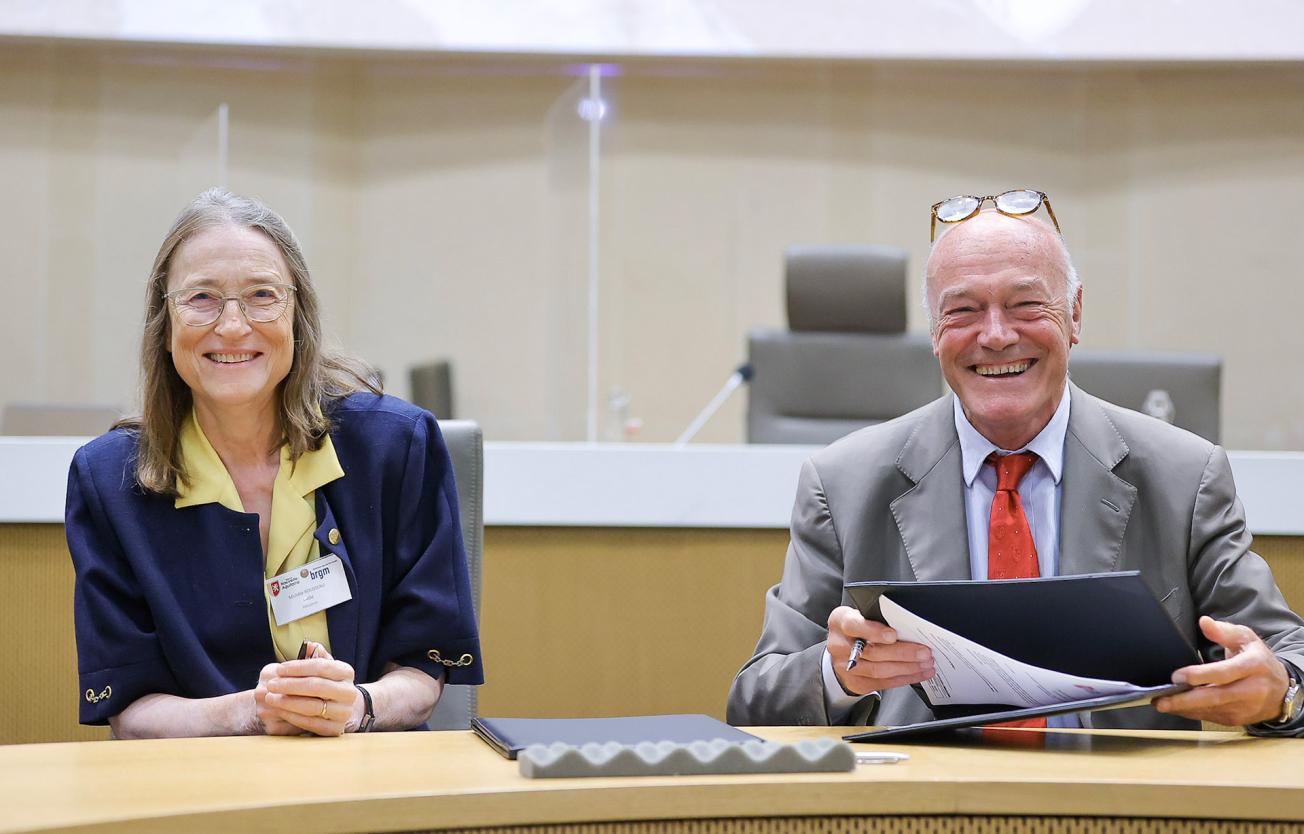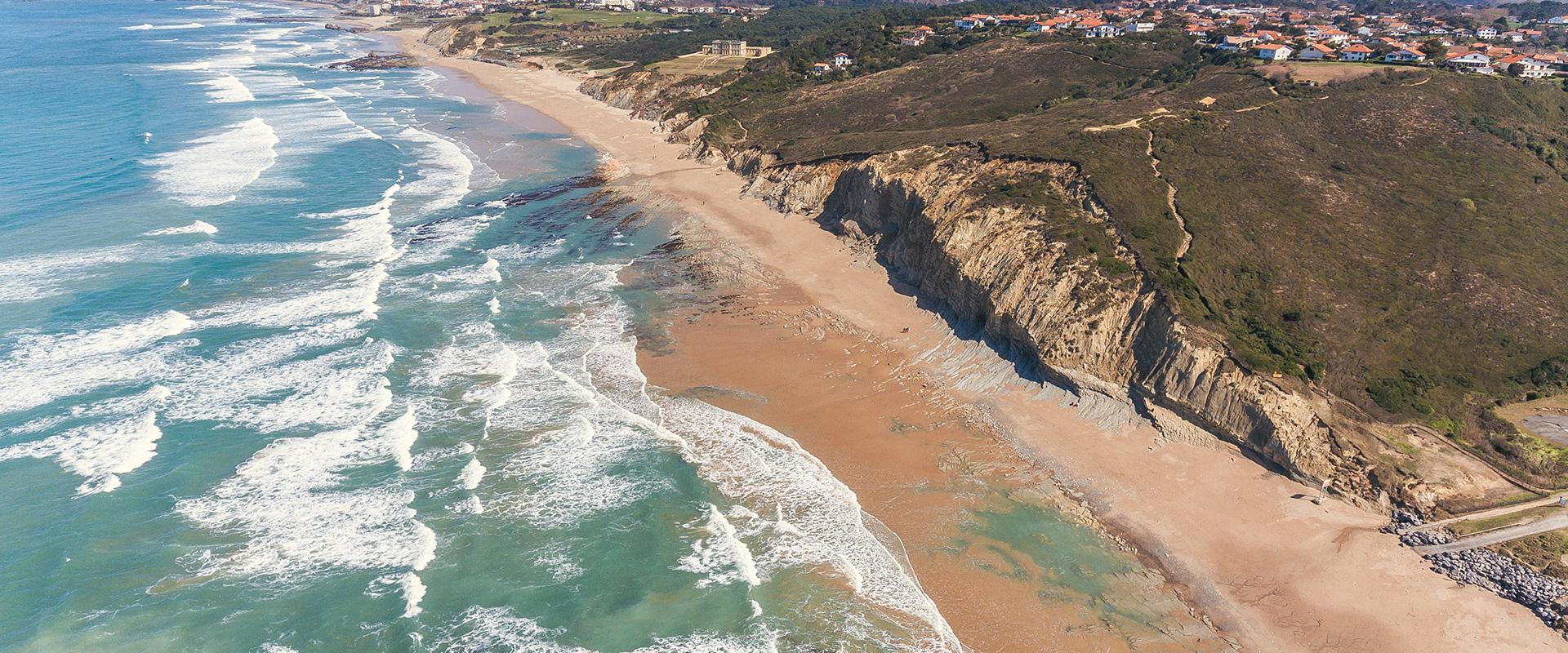
Michèle Rousseau, BRGM Chair and Managing Director, and Alain Rousset, President of the Nouvelle-Aquitaine Region, signed a partnership agreement on coastal risks and climate change in Bordeaux on Monday 5 September 2022.
© Quentin Salinier
Alain Rousset, President of the Nouvelle-Aquitaine Region, and Michèle Rousseau, BRGM Chair and Managing Director, formally signed a partnership agreement, at the Hôtel de Région in Bordeaux on Monday 5 September 2022, during a day of discussion dedicated to research and the coastline, bringing together various stakeholders (academic partners, elected representatives, officials from government and local authority departments, etc.).
The agreement aims to increase resources for research on coastal risks in Nouvelle-Aquitaine in a context in which, in the future, important environmental and societal issues will be concentrated in the area along the coastal strip.
An attractive, protected regional territory, facing considerable challenges
The coastline is one of the first places where public awareness of increasing natural risks that affect people is growing, particularly in the context of climate change. Both rich and fragile, the coastline is a coveted territory whose population is constantly growing, which amplifies the risks. The two main types of natural hazards that threaten the coastline are coastal erosion and coastal flooding. These hazards are chronic issues, sometimes occurring concurrently, particularly during storm events. They are amplified by climate change, in particular by accelerated sea level rise, and sometimes locally by human activities. They can endanger infrastructure, housing and certain ecosystems, and also pose a threat to groundwater resources along the coast.
With a coastline of more than 790 km, the coastline represents a major stake in the activity and attractiveness of the Nouvelle-Aquitaine Region, with its 1 million inhabitants and an expected increase of 300,000 inhabitants by 2040, and 49,000 jobs in the maritime and coastal economy. This attractiveness not only puts significant pressure on the quality and integrity of the environment, but also makes these spaces all the more vulnerable to natural hazards. Aware of the long-term impact of these hazards, the Nouvelle-Aquitaine Region has made them a focus of its research and innovation strategy to support its policy of sustainable development of coastal areas and to become a pilot region in this field at an international level.
A 3-year agreement
BRGM, the French geological survey, is a public research and consultancy institute, under the supervision of the Ministries of Research, Ecology and the Economy. Specialised in the study of the ground and subsurface, it has been providing its operational research competence for more than 70 years in Nouvelle-Aquitaine, in several fields: water resource management, natural hazards, energy resources, geothermal energy, energy storage, the circular economy and geological knowledge of French territory. Historically, BRGM has provided support to public authorities in Nouvelle-Aquitaine, on behalf of the State, for the management of natural resources, in particular by monitoring, measuring and analysing the evolution of the coastline for which the Observatoire de la côte Nouvelle-Aquitaine (OCNA) was founded in 1996.
As part of its site strategy, BRGM has decided, with the support of the Nouvelle-Aquitaine Region, to locate the management of its coastal-risks R&D activities in Nouvelle-Aquitaine, by transferring a specialised unit and some of its researchers and engineers from Orléans to Pessac. The framework agreement, signed for a period of three years by the Nouvelle-Aquitaine Region and BRGM, aims to strengthen the research capacities of the French geological survey in the region, in particular through a strong financial commitment from the Regional Council for large-scale research projects undertaken by BRGM and through help in finding premises for it, in the context of the 2021-27 CPER (State-Region Plan Contract).
Towards the creation of a centre of excellence for research on coastal risks and climate change
BRGM will thus develop its coastal-research centre in New Aquitaine and strengthen synergies with existing scientific projects such as the laboratories of the universities of Bordeaux, La Rochelle, Pau and Pays de l'Adour, the universities of Limoges and Poitiers, the CNRS, INRIA and INRAE. The aim is to eventually create an international centre of excellence with these institutions.
The Region actively supports the laboratories located on its territory for interdisciplinary coastal-research activity. It is thus committed to strengthening its scientific potential by allowing new teams or new research organisations to join it and by financing research programmes and chairs of excellence. In particular, it supports the two regional research networks of which BRGM is a member, “Risks and vulnerabilities for the adaptation and management of the coastline in Nouvelle-Aquitaine” (RIVAGES) and “What water for the future” (Naïades).
These research actions help shape the development policy of the Nouvelle-Aquitaine Region to meet the societal and environmental challenges arising from climate change. A policy committed to driving the necessary ecological, energy and societal transitions. The policy is set out in various framework documents including:
- the Regional Plan for Higher Education, Research and Innovation (SRESRI adopted in 2018);
- the NeoTerra roadmap and its 11 goals, adopted in 2019, including the conservation of natural resources, the development of alternative energies and sustainable urban planning, among others;
- the Regional Plan for Spatial Planning, Sustainable Development and Equality for all regions (SRADDET, adopted in 2020);
- the Regional Economic Development, Innovation and Internationalisation Plan, adopted in June 2022, which positions innovation as a key lever for responding to transitions.
To find out more
Press contact








